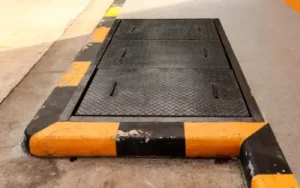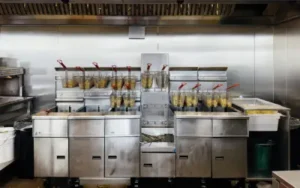Portland / Vancouver Metro - The Dalles - Hermiston OR & Tri Cities WA
Oregon Regulations on Grease Interceptors and Grease Traps

When it comes to the disposal of fats, oils, and grease (FOG), Oregon has some of the toughest regulations in the country. While these laws can seem like a pain to anyone who owns or manages a restaurant or food service business, they’re essential for maintaining your city’s plumbing infrastructure. Not only that, with violations often leading to costly fines and even shutdowns, proper disposal of your FOG just makes good business sense.
To help you remain compliant, let’s go over Oregon regulations on grease traps and FOG management.
The Quick Answer – What Are the Laws in Oregon About Grease Interceptors, Grease Traps, and FOG Disposal?
Let’s start with a quick overview. If you have a restaurant or food service establishment (FSE) in Oregon, you must have a system in place to ensure proper FOG disposal. Federal and local regulations mandate this.
In Portland, here’s a rundown of what’s required:
- Failing to install required grease interceptors.
- Failing to maintain grease interceptors.
- Failing to allow sampling access or entry to the facility for compliance inspections.
- Using emulsifiers, additives, enzymes, and biological agents designed to break down/digest FOG (Fats, Oils, and Grease) for discharge into the sewer system.
- Failing to submit maintenance-reporting documents.
- Failing to connect all FOG-producing fixtures to the required interceptor or FOG-removal equipment, as per standards.
- Failing to clean a grease interceptor at the required frequency.
- Failing to dispose of FOG waste at an approved facility.
That’s a lot, but most of these rules fall into one of a few different categories. Let’s go over these in greater detail so you understand “the spirit of these laws.”
Ready to talk to a septic system expert?
Click below and we'll call you back quickly!
Rule #1: You’re Required to Have a Working Grease Trap or Grease Interceptor That’s the Right Type and Size for Your Business

A grease interceptor that is too small or otherwise not suitable for your business could result in serious malfunctions and health risks. When choosing a system for your establishment, you should work with an expert who can help you select the right option for your needs.
If you call Speedy Septic, our experts will help set you up for operational success while ensuring that you have an approved grease interceptor that is in compliance with local codes.
Rule #2: Your Grease Trap or Interceptor Must Be Cleaned and Maintained Regularly
To operate efficiently, a grease interceptor requires proper maintenance. Insufficient or improper maintenance allows FOG to bypass the interceptor and enter the sewer lines. Infrequent cleaning can lead to severe issues for the food service establishment (FSE), including:
- Private drain line blockages
- Back-ups
- Foul odors
- Loss of business
What’s the Proper Amount of Maintenance for a Grease Interceptor?
An interceptor needs proper maintenance to operate efficiently. A poorly operating or improperly maintained grease interceptor will allow FOG to bypass and enter sewer lines. Not cleaning the interceptor frequently enough can cause private drain line blockages, back-ups, foul odors, and loss of business. Even worse, a FOG obstruction in the sewer line can cause a sewage overflow to the environment or into other buildings.
FSE operators are responsible for ensuring grease interceptors are properly maintained and accessible. They must also keep accurate records of all maintenance performed, providing maintenance reports within 14 days after each cleaning. These reports must include:
- The date of cleaning.
- The estimated depth of Fats, Oils, and Grease (FOG) and solids in the interceptor before cleaning.
- Any identified defects in the grease interceptor.
- The name and signature of the hauler or person performing the maintenance.
- The name and location of the FOG waste disposal site.
How Often Should You Clean or Pump?
The City of Portland is in charge of determining the required cleaning frequency based on the facility type, the size of the interceptor, and the volume of flow discharged.
Most grease interceptors require cleaning when they reach 25 percent FOG and solids capacity. However, some high-efficiency hydromechanical grease interceptors (HGIs) can hold up to 75 percent accumulation before cleaning is necessary.
Cleaning Frequency:
- Hydromechanical Grease Interceptors (HGI): Cleaned no less frequently than every 30 days.
- Gravity Grease Interceptors (GGI): Cleaned no less frequently than every 90 days.
If insufficient cleaning or maintenance leads to an obstruction in the sewer system, the city will take enforcement actions against establishments. You could also be held liable for any damages inflicted upon other affected homes or businesses.
Rule #3: You May Not Use Additives
A properly maintained grease interceptor does not require the use of additives to break down FOG. In fact, these substances can cause serious failures in your system that would allow grease to enter the city sewer system, which could lead to pipe damage or issues during the wastewater treatment process. To prevent these problems, the City of Portland prohibits the use of additives such as:
- Animal or synthetic enzymes
- Bacterial substances
- Chemical emulsifiers
Rule #4: You May Not Dump FOG into the Sewer
The goal of requiring grease traps and grease interceptors at restaurants and FSEs is to prevent FOG from reaching the sewer system. So it should come as no surprise that if you do dump FOG into the sewer – accidentally or not – you should expect some steep penalties.
What Are the Penalties for Violating Rules About FOG Disposal?

Violations of these rules may result in enforcement actions. Each day a violation continues is considered a separate violation. Enforcement actions will also increase in severity based on the violation’s actual or potential impact on public health, safety, or the environment.
Violations may fall into different classifications depending on the severity:
- Class I Violations: High deviation from regulations or substantial threat to public health, safety, property, or environment. Examples: introducing unpermitted materials to a public system, damage to a public improvement needing immediate repair, or refusal to comply.
- Class II Violations: Moderate deviation from regulations or significant threat to public health, safety, property, or environment.
- Class III Violations: Minor deviation from regulations or minimal threat to public health, safety, property, or environment. Examples: first-time reporting failure, minor site or BMP maintenance failure, de minimis discharge, or failure to retain/provide records.
- Warning Notice Violation: Minor reporting or operational violation resulting from a minor deviation from City regulations.
Penalties also vary in severity, from a simple warning to referral of the case to other agencies:
- Notice of Investigation
- Warning Notice
- Notice of Violation
- Voluntary Compliance Agreements: Do not prevent further enforcement if other violations arise.
- Compliance Order: May be used with an NOV. Noncompliance results in additional NOVs, a revised CO, and escalating penalties.
- Withholding Services: The City of Portland may withhold plan review/permitting for failure to remedy a violation, as permitted by the PCC.
- Notice of Termination
- Abatement: The City of Portland may address continuing violations or emergencies on public/private property after reasonable notice. Parties are responsible for all abatement costs and maintaining the required remedy.
- Legal Action: The City of Portland may sue for failure to take required corrective action.
- Referral to Other Agencies: Civil and criminal violations may be referred to federal, state, or local agencies.
When Do Inspections Happen?
City representatives are permitted, to the extent allowed by law, to enter a facility’s premises to verify compliance with these regulations.
Inspections may be conducted without prior warning at any time, both during and after normal working hours. This includes verifying the appropriate cleaning of grease interceptors, or as part of an emergency response or blockage investigation.
These inspections will encompass all areas of the facility that discharge or have the potential to discharge into the sanitary sewer system, and may also include system sampling. City representatives will adhere to all reasonable safety requirements for the facility, as communicated by the facility operator at the time of entry.
Which Agencies Govern and Enforce FOG Disposal in Oregon?
It varies from city to city, but the main agencies and pieces of legislation that create and enforce these regulations include:
- Oregon Specialty Plumbing Code
- Oregon Food Sanitation Code
- Bureau of Environmental Services
- Oregon Administrative Rules
- Oregon Association of Clean Water
- Environmental Protection Agency
- Various Other Local Agencies (Depending on Where You’re Located)
More Local Oregon Laws Governing FOG
Throughout this article, we’ve talked mostly about Portland laws regarding FOG, grease traps, and grease interceptors. We chose Portland because it’s in our service area and has a large population with many restaurants, so hopefully this information serves as many people as possible.
With this in mind, it’s also important to consider that different cities and states have different laws regulating FOG, so if you’re reading this from somewhere else, be aware that your laws will be somewhat different. How much different? Well, they should still be fairly similar – most cities and state regulations are.
What’s a Preferred Pumper?
A “Preferred Pumper” is a company that has entered into an agreement with the city to meet a higher standard of service and reporting. This includes:
- Proper Cleaning: Ensuring the interceptor is cleaned to the city’s specifications (removing FOG and solids, not just skimming the top).
- Accurate Reporting: Timely and correct submission of all maintenance reports, which the article notes must include the date of cleaning, estimated FOG/solids depth, any defects, the hauler’s signature, and the disposal site.
- Approved Disposal: Disposing of the FOG waste at an approved and permitted facility.
By choosing a Preferred Pumper, a restaurant or FSE can have greater confidence that they are meeting their maintenance and reporting obligations, reducing the risk of fines, sewer line blockages, and other enforcement actions. The program acts as a quality assurance measure for businesses to help them stay compliant with Portland’s strict FOG management rules.
Your Local Preferred Pumper
Navigating Portland grease regulations can be overwhelming, especially if you don’t know the ins and outs of each requirement. At Speedy Septic, we strive to make the process as easy as possible by offering convenient grease interceptor pumping and grease trap pumping services!
Our skilled team is recognized by the Preferred Pumper Program in Portland OR, so you can rest assured that each service will adhere to a high standard of quality that keeps your system in compliance at all times. From pumping to reporting, we can handle it all.
Just give us a call to speak with an expert.
Back to Grease Interceptor Pumping
Portland Grease Regulations in Portland OR and Vancouver WA
Also Serving Customers In These Regions
